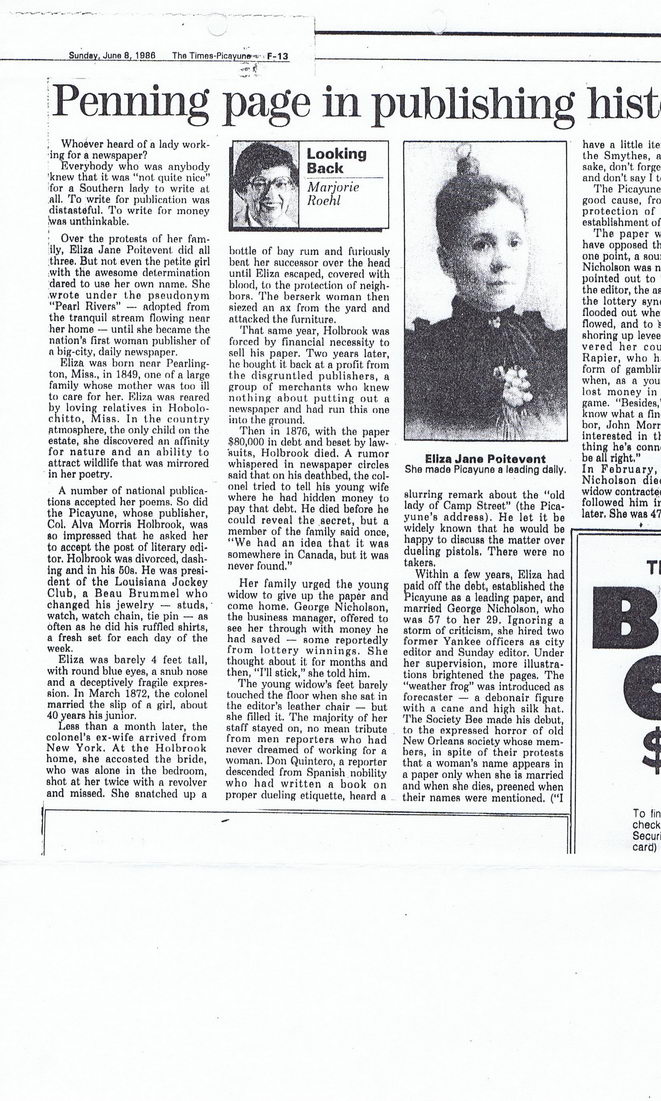This text was obtained via automated optical character recognition.
It has not been edited and may therefore contain several errors.
kx3l Sunday. June 8, 1988 Tha Timfls-Picayuntr-*1 ? F-13 ??' f'. Penning page in publishin; ? Whoever heard of a lady working for a newspaper? Everybody who was anybody 'knew that it was ?not quite nice? >for a Southern lady to write at all. To write for publication was distasteful. To write for money Jwas unthinkable. I ; Over the protests of her family, Eliza Jane Poitevent did all .three. But not even the petite girl with the awesome determination dared to use her own name. She wrote under the pseudonym ?Pearl Rivers? ? adopted from the tranquil stream flowing near her home ? until she became the nation?s first woman publisher of a big-city, daily newspaper. Eliza was born near Pearlington, Miss., in 1849, one of a large family whose mother was too ill to care for her. Eliza was reared by loving relatives in Hobolo-cnitto, Miss. In the country Atmosphere, the only child on the estate, she discovered an affinity for nature and an ability to attract wildlife that was mirrored in her poetry. A number of national publications accepted her poems. So did the Picayune, whose publisher, Col. Alva Morris Holbrook, was so impressed that he asked her to accept the post of literary editor. Holbrook was divorced, dashing and in his 50s. He was president of the Louisiana Jockey Club, a Beau Brummel who changed his jewelry ? studs, watch, watch chain, tie pin ? as often as he did his ruffled shirts, a fresh set for each day of the week. Eliza was barely 4 feet tall, with round blue eyes, a snub nose and a deceptively fragile expression. In March 1872, the colonel married the slip of a girl, about 40 years his junior. Less than a month later, the colonel?s ex-wife arrived from New York. At the Holbrook home, she accosted the bride, who was alone in the bedroom, shot at her twice with a revolver and missed. She snatched up a Looking Back illL- Marjorie Roehl bottle of bay rum and furiously bent her successor over the head until Eliza escaped, covered with blood, to the protection of neighbors. The berserk woman then siezed an ax from the yard and attacked the furniture. That same year, Holbrook was forced by financial necessity to sell his paper. Two years later, he bought it back at a profit from the disgruntled publishers, a group of merchants who knew nothing about putting out a newspaper and had run this one into the ground. Then in 1876, with the paper $80,000 in debt and beset by lawsuits, Holbrook died. A rumor whispered in newspaper circles said that on his deathbed, the colonel tried to tell his young wife where he had hidden money to pay that debt. He died before he could reveal the secret, but a member of the family said once, ?We had an idea that it was somewhere in Canada, but it was never found.? Her family urged the young widow to give up the paper and come home. George Nicholson, the business manager, offered to see her through with money he had saved ? some reportedly from lottery winnings. She thought about it for months and then, ?I?ll stick,? she told him. The young widow?s feet barely touched the floor when she sat in the editor?s leather chair ? but she filled it. The majority of her staff stayed on, no mean tribute from men reporters who had never dreamed of working for a woman. Don Quintero, a reporter descended from Spanish nobility who had written a book on proper dueling etiquette, heard a Eliza Jane Poitevent She made Picayune a leading dally. slurring remark about the ?old lady of Camp Street? (the Picayune?s address). He let it be widely known that he would be happy to discuss the matter over dueling pistols. There were no takers, Within a few years, Eliza had paid off the debt, established the Picayune as a leading paper, and married George Nicholson, who was 57 to her 29. Ignoring a storm of criticism, she hired two former Yankee officers as city editor and Sunday editor. Under her supervision, more illustrations brightened the pages. The ?weather frog? was introduced as forecaster ? a debonair figure with a cane and high silk hat. The Society Bee made his debut, to the expressed horror of old New Orleans society whose members, in spite of their protests that a woman?s name appears in a paper only when she is married and when she dies, preened when their names were mentioned. (?I hist have a little ite: the Smythes, a sake, don?t forge and don?t say I ti The Picayune good cause, fro protection of establishment of The paper w have opposed th one point, a soui Nicholson was n pointed out to the editor, the as the lottery syn< flooded out whe flowed, and to to shoring up levee vered her cou Rapier, who h, form of gamblir when, as a you lost money in game. "Besides,1 know what a fin' bor, John Morr interested in tl thing he?s conn* be all right.? In Februarv, Nicholson die< widow contracted followed him ir later. She was 47 TI To fin check Securi card)

Pearl Rivers Penning page in publishing history -part1